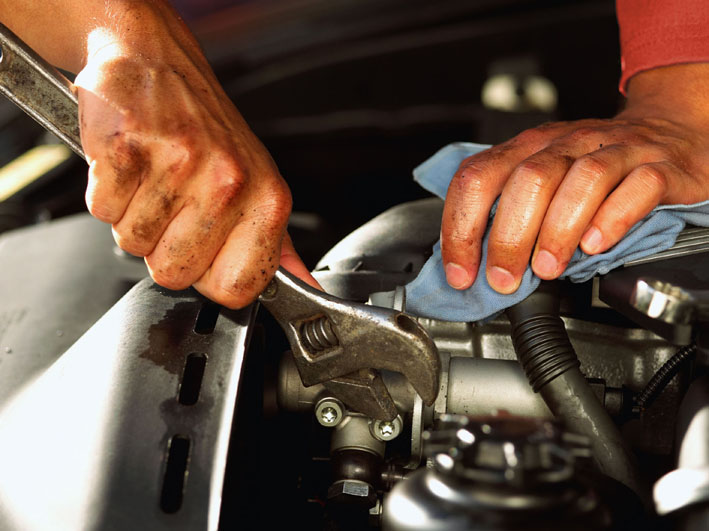
Getting your car fixed in Colombia is more than a simple trip to the mechanic.
Gerald Barr begins his new column on some of the curiosities and contradictions of life in Colombia with an exhausting journey
My car is due its revision tecnica, the yearly mechanical check to make sure it’s fit for the road. A friend visiting Colombia for the first time is surprised to hear of this legal requirement. “You mean in Colombia there are actually laws on how your car runs?” he exclaims.
“Yes, and why not?” I reply, a bit indignant at the constant assumption from outsiders that my adopted country is just a hangout for Del-boys and dodgy dealers. I try to impress him with the city’s green credentials – the Sunday ciclovia has been around longer than Al Gore, I explain. But at that moment a bus belching black smoke chugs past our cafe window so the message is lost.
The next day I am down at the car test centre, large and smart with a production-line system where your car is whisked away by mechanics while you sip tintos and watch telenovelas. There is a large sign on the wall reminding all customers not to bribe the staff at the test centre. All the testing action takes places behind opaque screens, but you can just see the top of the car moving from station to station as brakes, lights and gases are checked.
After an hour the woman on reception gives me the results. “The car failed. All was fine except the exhaust gases. You need the carburettor adjusted”, she says. I am slightly miffed since I had the carb cleaned and adjusted the month before. However, the good news is I can get the adjustment done and come back for re-test the same day with no extra charge. I head off to find a mechanic shop.
The only place open is nearby with some colourful characters lounging in old car seats and nursing their first Saturday-afternoon beers. I park up and the oldest mechanic opens a rusty cabinet that says ‘Gases’ and turns on an ancient computer inside. “It will take some time to warm up”, he advises as ‘Windows 95’ flickers on then disappears from the computer screen. After three attempts it boots up and the gas analysis software loads.
The old mechanic sticks the gas detector rod into the exhaust pipe, we rev the engine, he leans under the bonnet to tweak the carburettor, and we watch the gas levels slowly drop on the computer screen. After more tweaking we are within the legal limits.
“Como una uva!” Like a grape! He exclaims, a Bogotá phrase for close-to-perfection. I head off back to the test centre and the woman sends the car straight to the gas bay. It fails again. “Better, but still too high” she says, handing me a print-out. “Try again.” I am too surprised to argue, and she looks like the type not to listen, so I jump in the car and head back to the mechanic shop.
Back at the taller the mechanics are a few beers further into their Saturday afternoon shift, but happy to try again. Everyone is now interested in why the car failed twice. We crowd around the carburettor.
“It’s the altitude. Bogotá is so high but the test machines are not calibrated for up here”, opines one. “The fuel companies are mixing ethanol in the gasoline, that screws up the results”, says another. “All the test centres use different software. It’s hit and miss”, claims the old guy. The first one recommends a local trick of sticking crushed-up mothballs in the fuel tank an hour before the test “It raises the octane level and fools the test device,” he says.
A bit exasperated I blurt out the question in everyone’s mind who owns a car in Bogotá: “How come my perfectly clean smoke-free car fails the test but all these buses and trucks spew out black smoke all day and no-one stops them? Why aren’t they put off the road?” I demand.
There is a long silence from the mechanics. Then the old one rolls his eyes like Fraser from Dad’s Army: “Why, they’re Los Intocables”, he says in a dark tone.
Untouchables. Intocables. I repeat the word slowly, rolling it around my mouth like a grape. The untouchables. In Colombia they are the powerful transport bosses whose trucks and buses are free to belch black smoke.
We run the gas tests again and they are OK, once again. But will the gas machine at the test centre agree? The day is nearly gone and so is my patience. One of the mechanics senses my concern. “Give me the car for an hour and I will get you the test certificate, guaranteed”, he says.
Related: Going local: No weddings and a Colombian funeral
An hour later he turns up at my door with the car, the test certificate and printed results. The exhaust appears to be in order . “I don’t want to know how you did it”, I tell him. “Then I won’t tell you”, he says with a smile, handing me the keys.
I feel ashamed that for a brief moment I might just have joined team intocable. I hope the car passed on its own, or maybe with just a few mothballs in the tank.
Another week goes past and another coffee with my friend on the Septima. “How’s the car?” he asks. I answer him with an old line from Ismaili mysticism; “Nothing is true. Everything is permitted.” He looks suitably confused. “Let’s just say it passed”, I say. “Eventually.”
By Gerald Barr





